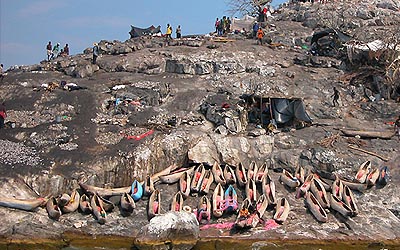| Protecting Malawi cichlidsby
Ad Konings / continued part 4—
As a consequence fishing occurs in all park waters and in fact some places are so much over-fished that at present absolutely none of the many sand-dwelling or open water species, still present 10 years ago, can be found. It is also forbidden to set up camp or just to live on any of the islands included in the park, but hundreds of fishermen manage to dodge the law and permanently live in the Park. Since most of the sand-dwelling cichlids around these islands have been wiped out the fishing effort is now directed to catching the rock-dwelling mbuna. I have seen several small-meshed gill nets with hundreds of trapped mbuna right in front of Park headquarters at the southeastern tip of Thumbi West Island. Mbuna are also caught with so-called chirimila nets, originally intended for utaka but they have disappeared as well, around the islands where plankton blooms lure the mbuna away from rocks. |
 This
gruesome scenario was also in place around the Maleri islands where, over
the years, beach seines had torn out the aquatic plants in the shallow
sandy areas and left a bare sandy bottom void of any fish. Plankton-feeding
mbuna were caught in chirimilas and trees on the island were cut for firewood
for the numerous camps on the three islands. The islands were too far from
Park headquarters at Otter Point (Cape Maclear) and the illegal fishing
could thus continue virtually uncontrolled. The situation was grim all
around the lake and the various tourist establishments had difficulty finding
good spots for their guests to snorkel or dive and meet some of the awesome
fish known to inhabit Lake Malawi. This
gruesome scenario was also in place around the Maleri islands where, over
the years, beach seines had torn out the aquatic plants in the shallow
sandy areas and left a bare sandy bottom void of any fish. Plankton-feeding
mbuna were caught in chirimilas and trees on the island were cut for firewood
for the numerous camps on the three islands. The islands were too far from
Park headquarters at Otter Point (Cape Maclear) and the illegal fishing
could thus continue virtually uncontrolled. The situation was grim all
around the lake and the various tourist establishments had difficulty finding
good spots for their guests to snorkel or dive and meet some of the awesome
fish known to inhabit Lake Malawi. |
